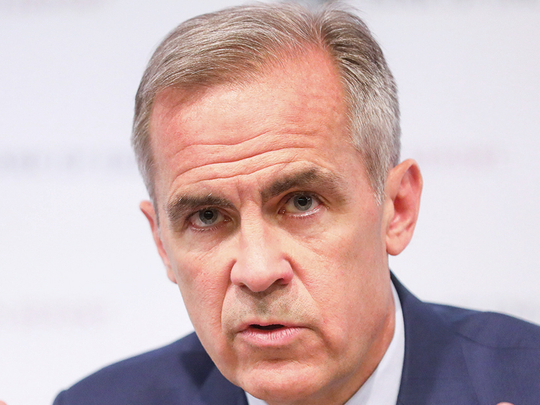
London: The Bank of England pushed interest rates above their financial crisis lows on Thursday, but signalled it was in no hurry to raise them further as Brexit approaches with no clear outline of Britain’s future relationship with the European Union (EU).
The BoE’s nine rate-setters were unexpectedly unanimous in their vote to raise rates to 0.75 per cent from 0.50 per cent, the level at which they have spent most of the past decade apart from 15 months after the 2016 Brexit vote when they were cut even lower.
Economists polled by Reuters had mostly expected a 7-2 vote in favour of a hike.
The BoE said that while growth had slowed ahead of Britain’s departure from the EU in March 2019, the country’s economy was operating at almost its “speed limit,” or full capacity, raising the prospect of more home-grown inflation pressure ahead.
But the message for borrowing costs remained one of gradual and limited increases as the central bank saw inflation only a fraction above its 2 per cent target over the next few years.
BoE Governor Mark Carney, explaining a new estimate by the central bank of neutral interest rates for Britain’s economy, stressed the gradual path for rising rates ahead.
“Policy needs to walk — not run — to stand still,” he said.
Sterling rose modestly against the dollar immediately after the BoE’s announcement of a 9-0 vote to raise rates but turned around and hit its lowest levels of the day after Carney’s comment.
The BoE said its forecasts were based on bets by investors who expect another rate hike only in late 2019 or early 2020, with Bank Rate creeping up to 1.1 per cent in late 2020. That was a fraction lower than a projection of rates of 1.2 per cent the last time the BoE published forecasts for the economy in May.
“The economy has done just about enough for the Bank of England to justify a hike today. But no one should get too excited about this being a sign of things to come,” said Luke Bartholomew, an investment strategist at Aberdeen Standard Investments.
“It is almost unthinkable that the Bank of England will follow up with further rate rises in the next few months given the risks on the horizon.”
The world’s fifth-biggest economy has slowed since the referendum decision to leave the EU.
With less than eight months until Brexit, London and Brussels — as well as key members of Prime Minister Theresa May’s Conservative Party — remain far apart on what their future trading relationship should look like.
The BoE said the economy “could be influenced significantly by the response of households, businesses and financial markets” to news on Brexit.
But the central bank continued to stress that Britain’s economy was at risk of too much inflation even with slow growth.
The central bank said inflation in two years’ time was likely to be 2.09 per cent, above the BoE’s 2 per cent target.
It expected Britain’s economy would grow by 1.4 per cent this year, unchanged from its forecast in May, but it nudged up its 2019 forecast to 1.8 per cent from 1.7 per cent.
Pound extends losses on Carney comments
London: The pound extended losses on Thursday after the Bank of England raised interest rates from crisis era lows but was cautious about any further tightening with an uncertain Brexit on the horizon. A broadly rallying dollar also hit the pound. Sterling fell as much as 0.8 per cent to $1.3017, down from around $1.31 before Governor Mark Carney gave his post-rate decision news conference. The pound also fell against the euro from an earlier flat position. It dropped 0.4 per cent at 89.150 pence per euro as Carney spoke.
-Reuters











